What Day of the Week Is Most Common to Get Married? Unveiling Wedding Trends
Selecting the perfect wedding date is a significant decision for couples planning their nuptials. While personal preferences and special anniversaries may influence this choice, there is a notable trend in the most common day of the week to exchange vows. Traditionally, Saturdays have emerged as the frontrunners for weddings due to several pragmatic reasons. Benefits include the convenience it offers guests who can attend without the worry of work the next day, and the full weekend that allows for extended celebrations and travel time.
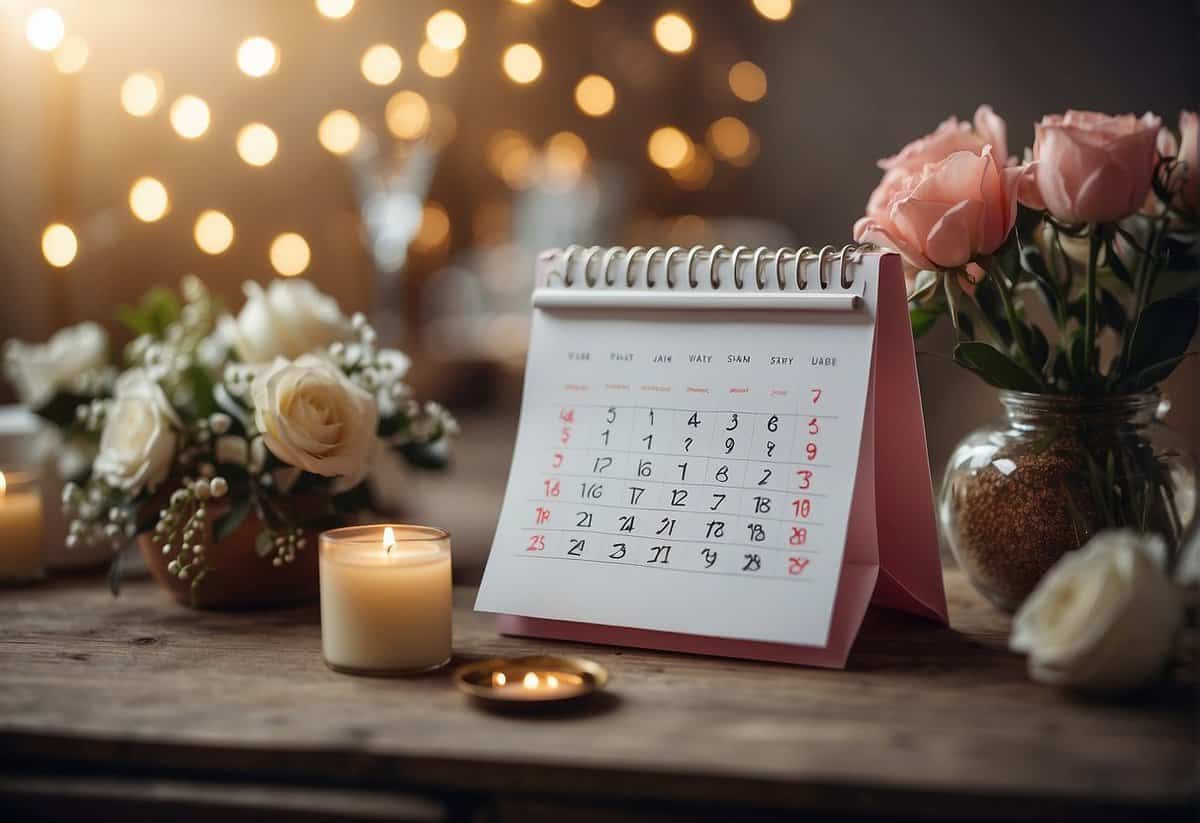
Despite the weekend’s allure, weekdays are increasingly becoming popular choices, particularly for couples looking to manage their budgets more effectively. Weekday weddings can often mean lower venue and vendor costs, and with Mondays being typically the most economical choice, there’s a shift in how couples plan their special day. This demonstrates how both the significance of seasons and months, along with economic and logistical considerations, play a vital role in determining the most popular days to tie the knot.
Key Takeaways
- Saturdays are traditionally the most popular day for weddings.
- Weekday weddings can offer budgetary advantages.
- Choosing a wedding date involves considering several factors, including logistics and seasons.
Determining the Most Popular Days for Weddings
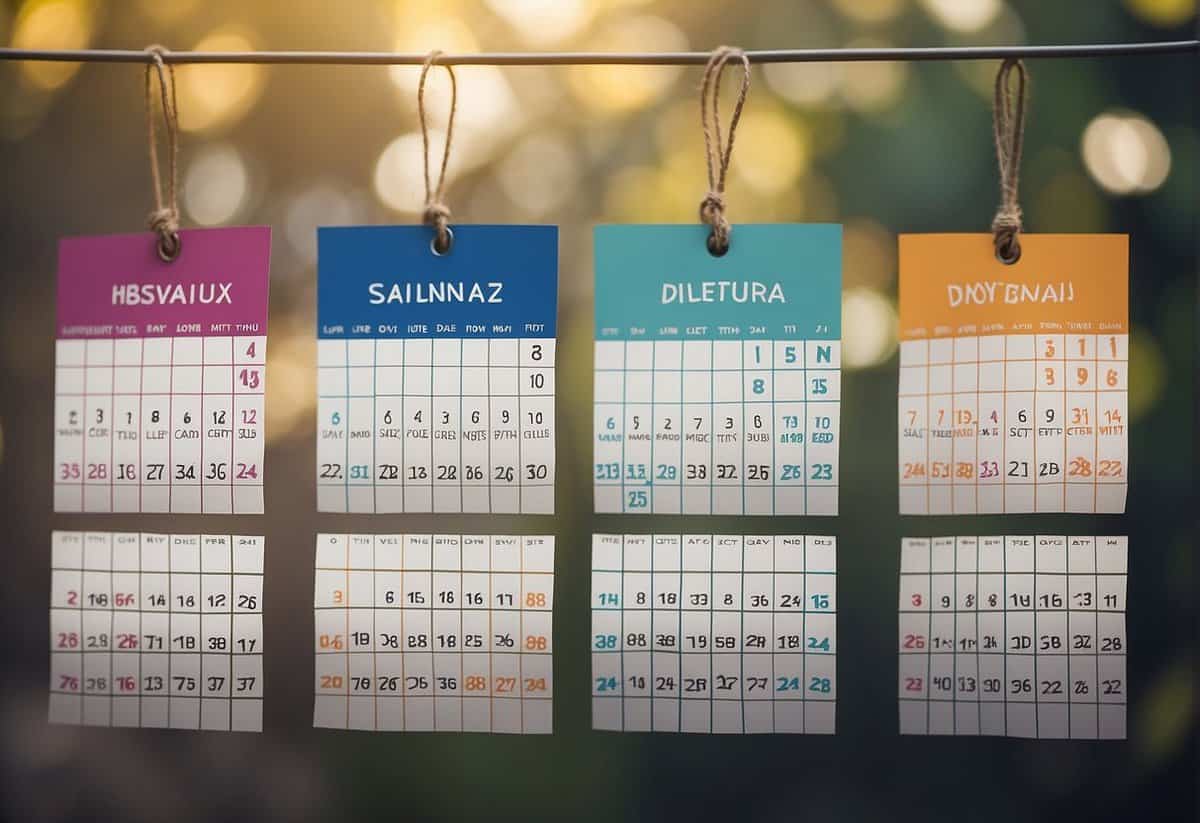
When you’re planning your special day, knowing the most popular days for weddings can be incredibly helpful for your planning process. Let’s unfold how certain days have become favorites and why they might or might not work for you.
Key Factors Influencing Wedding Dates
The day you choose for your wedding is often shaped by a mix of personal preferences, cultural traditions, and practical considerations. Saturdays have come out on top as the most sought-after day for couples to tie the knot, primarily because it allows guests to attend without taking time off work and provides a buffer day before returning to the weekly routine. Among the months, June stands out as a peak wedding month due to the pleasant weather and the start of the summer holidays. On the flip side, the popularity of Saturdays during peak wedding months can lead to increased demand for venues and vendors, often resulting in higher costs.
Historical Trends in Wedding Dates
Looking back, certain patterns emerge that highlight the evolution of preferred wedding dates. While summer used to reign supreme for nuptials, more recent trends show a shift towards fall, particularly when it comes to fall weddings in September and October. These months have been climbing the popularity ladder due to moderate weather and picturesque autumnal backdrops. Real couples across various platforms have pointed to dates like September 21, 2024, as one of the top picks. Meanwhile, if you’re considering the fall, it’s worth noting that October has been anticipated as the most popular wedding month in recent years, embracing the essence of the wedding season with its crisp air and colorful foliage.
The Significance of Seasons and Months
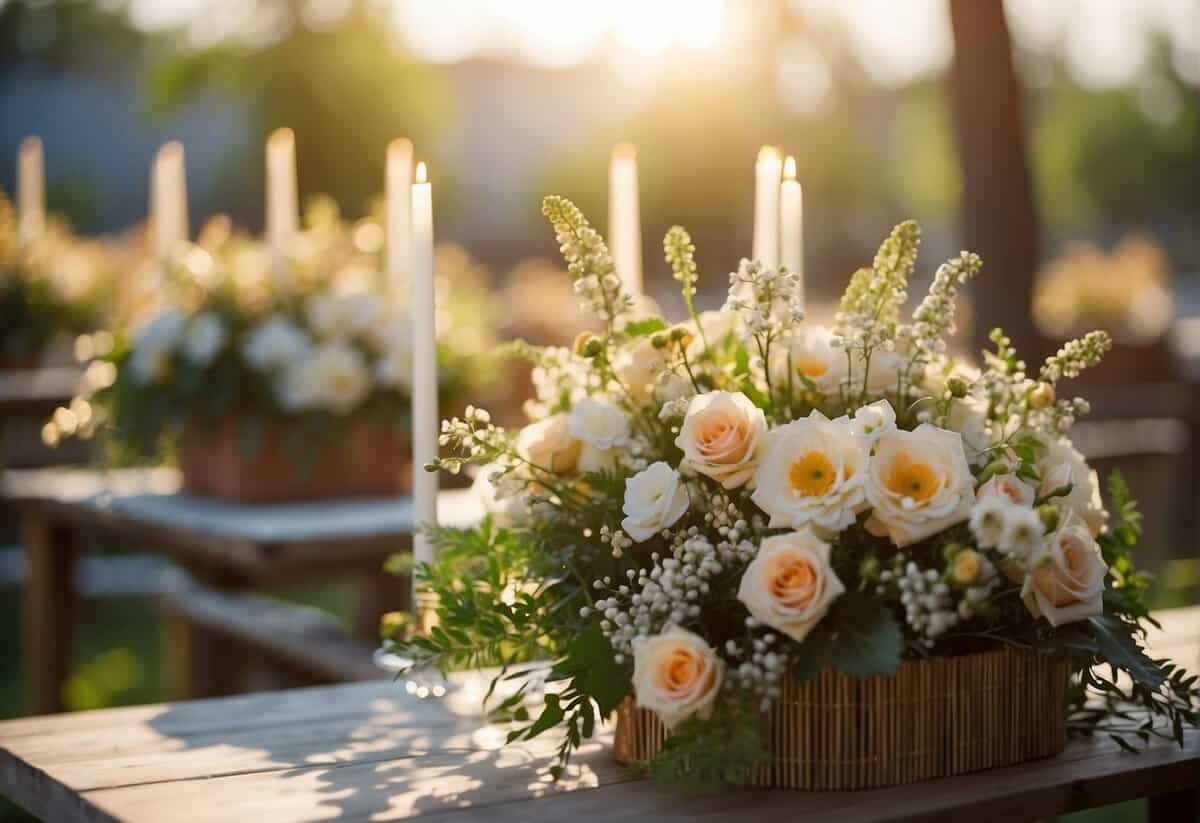
When planning your wedding, you might consider not just the venue and the guest list, but also the time of year you’d like to celebrate your special day. Seasons and months can have a significant impact on the ambiance, cost, and availability of venues. Let’s explore why some seasons are more popular than others and why some couples choose the less crowded off-season months for their weddings.
Summer and Fall: Peak Wedding Seasons
Summer, with its warm weather and long days, is naturally a sought-after season for weddings. July and August are particularly popular for their typically stable weather, offering you the chance to have an outdoor ceremony or reception with less concern about rain ruining your day. Alongside the favorable climate, summer months provide a vibrant backdrop for wedding photos with blooming nature and lush greenery.
Moving into Fall, especially September and October, you’ll find the most popular wedding months according to The Knot. As the heat of summer gives way to cooler temperatures, the changing leaves offer a stunning natural palette of reds, oranges, and yellows for your wedding theme. Autumn weddings can also be less expensive than peak summer events, although prices and demand stay relatively high due to the season’s popularity.
Winter and Spring: The Off-Season Appeal
The Winter months, particularly November, December, and January, bring a distinctive charm with the possibility of a magical snowy backdrop. While winter is often considered the off-season, a Winter wedding can be quite romantic and often more budget-friendly, due to lower demand for venues and services.
Once Spring arrives, February through May weddings begin to blossom just as the flowers do. Spring is a time of renewal and growth, making it a poetic start for a marriage. Choosing a Spring wedding can mean more availability and potentially more favorable pricing than peak summer or fall seasons. It’s a sweet spot for couples looking for a balance between the beauty of the season and managing costs. However, be mindful that weather in spring can be unpredictable, which is something to consider if you’re dreaming of an outdoor event.
Economic Considerations for Selecting a Wedding Date
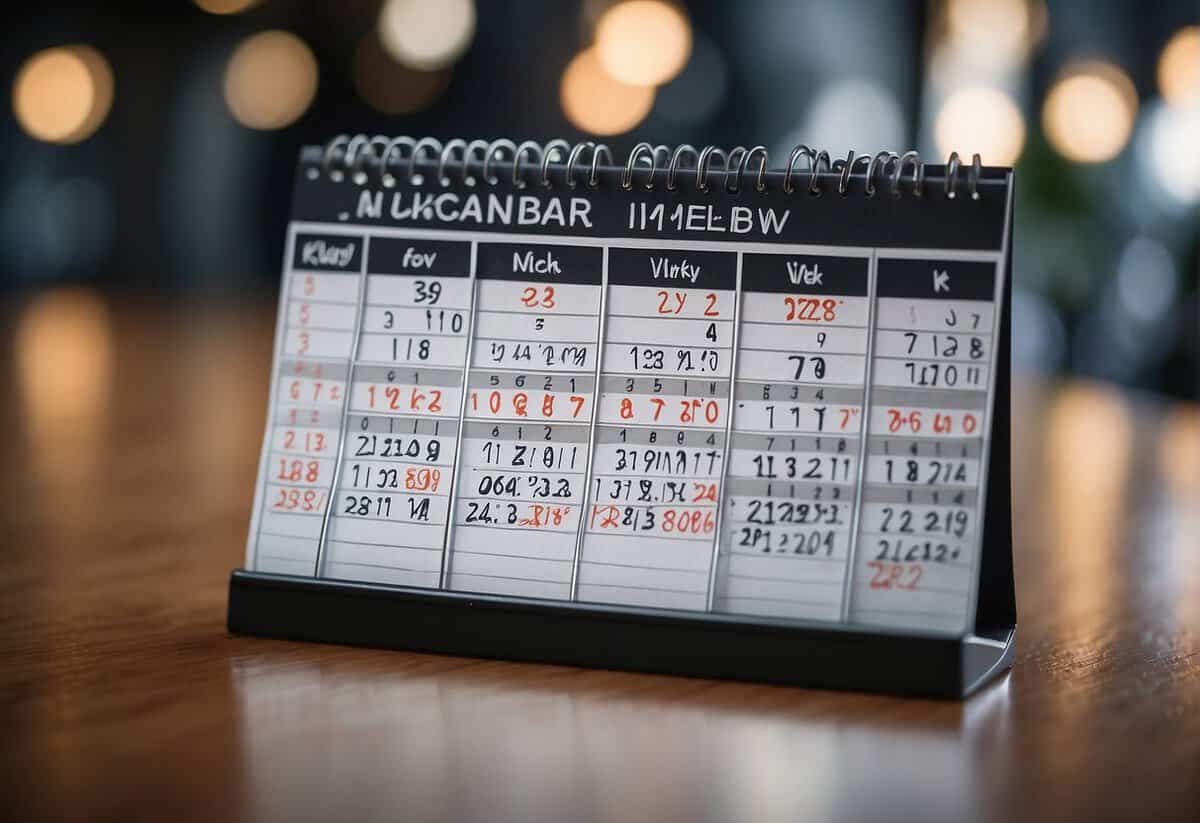
When planning your wedding, being savvy with your choices can lead to significant cost savings. Selecting the right date is a strategic decision that impacts your wedding budget.
Budgeting for Your Big Day
Planning your nuptials involves a detailed budget. The cheapest day to get married can vary, but generally, weekdays offer lower rates compared to weekends due to their lowered demand. Specifically, Monday weddings can be typically more affordable, with costs increasing as you approach the weekend.
- Venue Costs: Venues might offer discounts for weekday dates.
- Vendor Prices: Photographers, caterers, and others may charge less on off-peak days.
- Accommodations: If you have traveling guests, hotels might provide better rates during the week.
Adjusting your wedding date can make a significant difference in your overall budget, allowing you to allocate money towards other wedding aspects or to save for your future together.
Cost Benefits of Off-Peak Wedding Dates
Choosing an off-peak wedding date not only helps with budgeting but also invites potential discounts and perks.
- Seasonal Discounts: Marrying during less popular months, like January or February, can lead to lower costs.
- Day of the Week: Weekdays are typically cheaper, with Monday being most affordable.
- Time of Day: Consider a morning or afternoon event over an evening affair to cut costs.
Embrace flexibility in your wedding planning to benefit from economic advantages without compromising the joy and elegance of your big day.
Logistical Aspects of Wedding Planning
When you begin your wedding planning process, securing a venue and coordinating with vendors are among your top priorities. Your decisions will hinge on their availability and how they can accommodate the needs of your guests, especially in terms of travel plans.
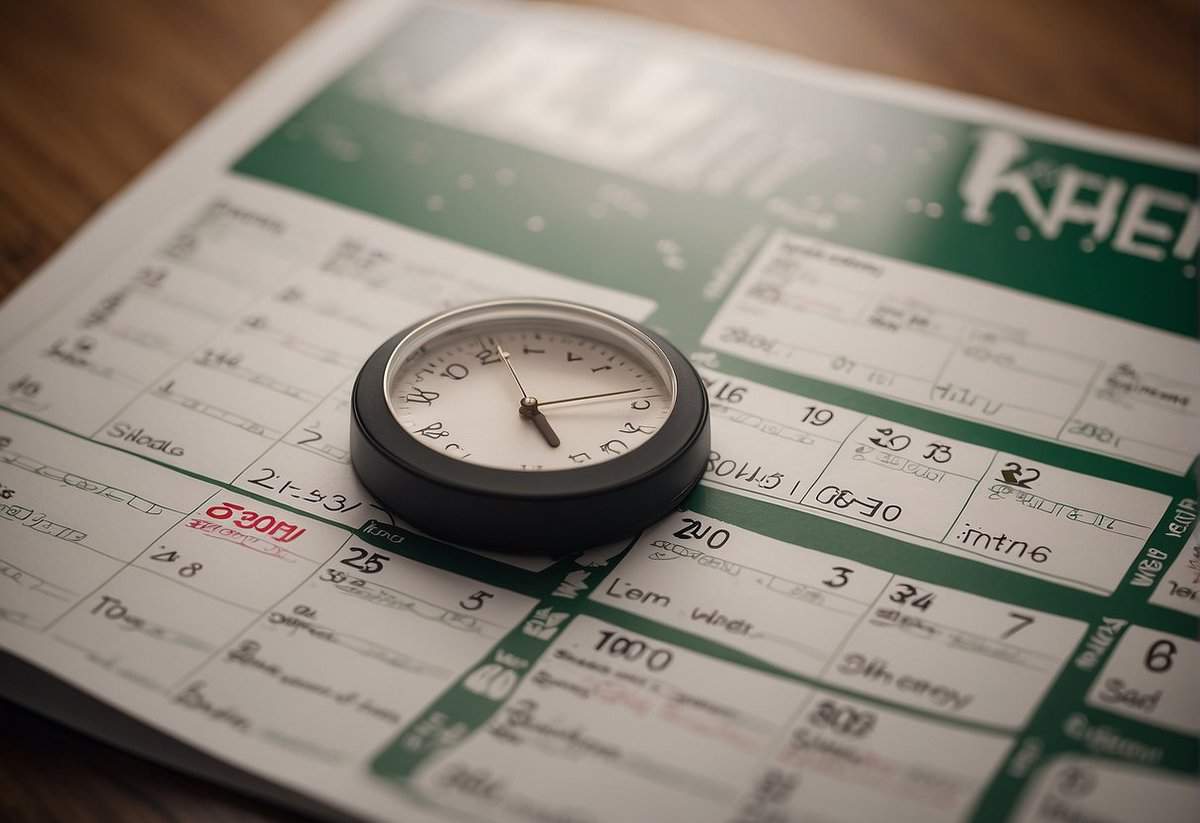
Venue and Vendor Availability
Selecting a venue is a pivotal first step in your wedding planning process. The availability of venues often dictates available wedding dates. Peak wedding season typically runs from late spring to early fall, where Saturdays are especially sought-after. Booking your desired venue can require acting fast and possibly being flexible with your wedding date. When considering vendors, including caterers, photographers, and florists, their schedules fill up quickly during this time. Using tools like The Knot Real Weddings Study can help you gauge how far in advance couples in your area are booking these services.
Accommodating Guests and Travel Plans
If you’re planning a destination wedding or have many guests traveling, think about their convenience as well. Choose a wedding venue that’s accessible and has nearby accommodations. Consider creating a travel itinerary or guide for guests, especially if your wedding coincides with a holiday or event that might affect travel and lodging. Provide options for different budgets and ensure there’s adequate transportation to and from the venue. For destination weddings, it’s courteous to send save-the-dates earlier in the planning process to allow your guests plenty of time to book travel and make arrangements.
Frequently Asked Questions
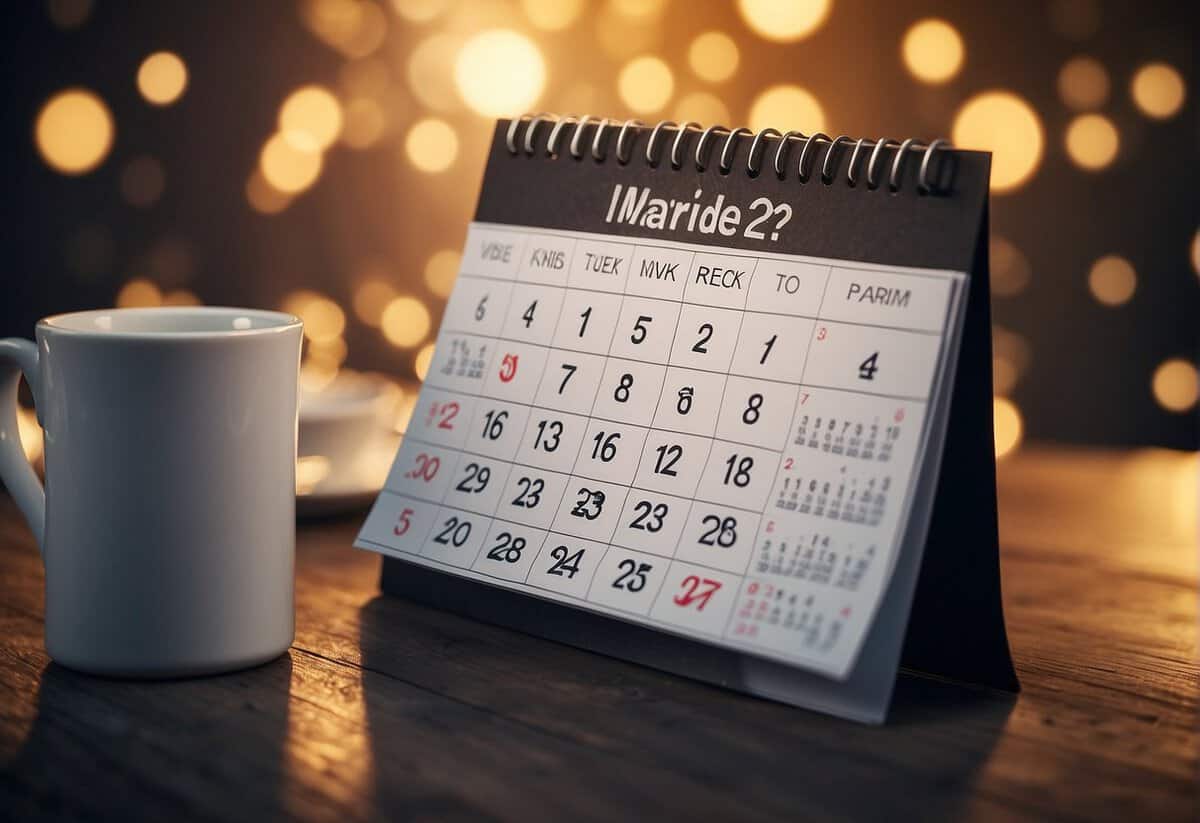
When planning your wedding, selecting the right date is crucial. Your choice can be shaped by personal preferences, cultural considerations, and practicalities.
What factors should be considered when choosing a wedding date?
You need to think about your budget, guest convenience, and venue availability. Also, consider seasonal weather patterns that could affect your big day.
How does one decide on the best day of the week for their wedding ceremony?
Look at factors like cost—weekday weddings often result in savings—and guest availability. Weekday weddings can be less traditional but may cause conflicts with guests’ schedules.
What are some common superstitions regarding wedding days?
Superstitions vary widely. Some believe that marrying on a day with numerical patterns is lucky, while others may steer clear of certain dates based on cultural beliefs.
Which part of the year is considered most auspicious for weddings?
This depends on cultural and regional traditions. Generally, spring and summer are popular, but off-season months like December to February could be less costly.
How might astrology influence the selection of a wedding date?
If astrology is important to you, you might choose a date when planetary alignments are favorable. Astrological consultations can offer guidance on auspicious dates and times.
What are some considerations for selecting a memorable and lucky wedding date?
Beyond personal and cultural beliefs, consider unique dates with strong numerical patterns, or align your wedding with significant personal milestones.

